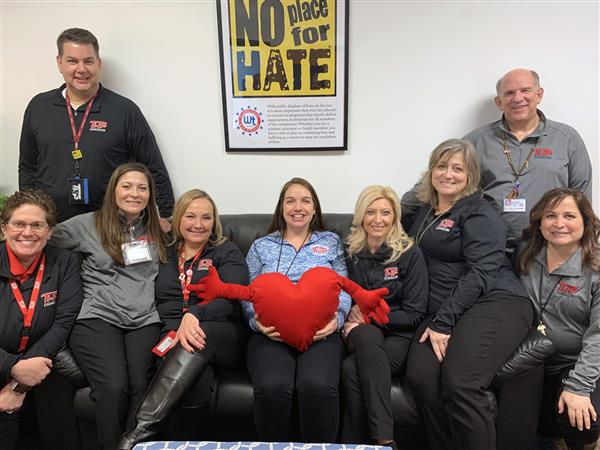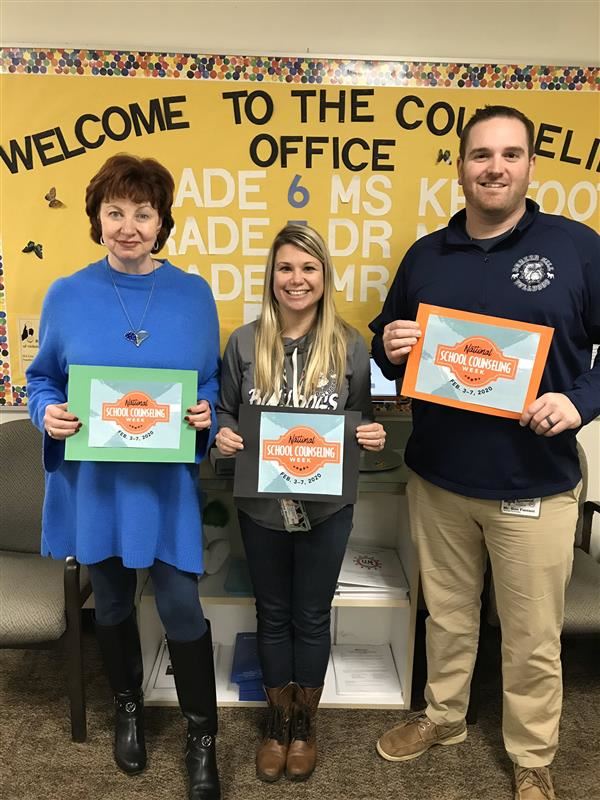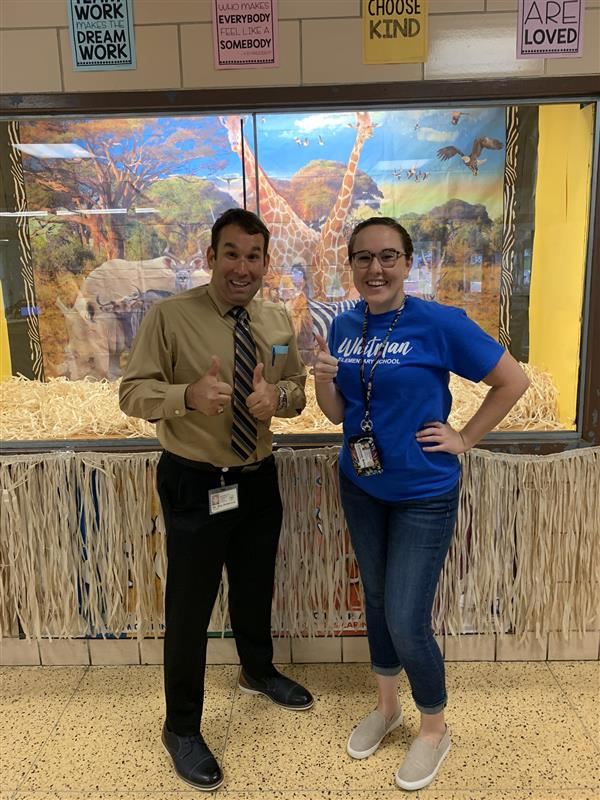Cheers to Counselors
Washington Township Public Schools’ Counseling Department is More than Just the Guidance Offices of the Past
 Washington Township High School counselors pose in their office. They include: Seated (left to right) – Sandy Stockl, Nicole Venere, Karin Eckert-Carpenter, Amanda Hamer, Andra Williams, Judy Nelson, Fran Mulvihill; Standing – Carl Palmer, John Tortoriello. Missing from photo: Briana Baud.
Washington Township High School counselors pose in their office. They include: Seated (left to right) – Sandy Stockl, Nicole Venere, Karin Eckert-Carpenter, Amanda Hamer, Andra Williams, Judy Nelson, Fran Mulvihill; Standing – Carl Palmer, John Tortoriello. Missing from photo: Briana Baud.
WASHINGTON TOWNSHIP – They still provide academic and career guidance, but the dedicated professionals working in Washington Township Public Schools’ counseling offices have taken the “guidance” out of the outdated term “guidance counselor.” It’s been a few years since Director of District School Counseling Jennifer Grimaldi arrived in Washington Township. Since then, she has pushed a rebranding of her department, which is eager to serve District students and families both inside and outside of the classroom.
 “I think a lot of parents don’t realize that we’re more than counselors for academics and college or career preparation,” Grimaldi said. “They don’t realize that we also provide social and emotional counseling. We’re in the classrooms. We provide seminars for families after school hours. We’re a very all-encompassing department.”
“I think a lot of parents don’t realize that we’re more than counselors for academics and college or career preparation,” Grimaldi said. “They don’t realize that we also provide social and emotional counseling. We’re in the classrooms. We provide seminars for families after school hours. We’re a very all-encompassing department.”
And it’s a department that she is proud to champion and celebrate.
National School Counseling Week kicked off on Monday, February 3rd, and continues through this Friday. Washington Township Schools are celebrating their counselors for all the things they provide their school communities. Grimaldi recently revamped the department with a focus on aligning Washington Township with guidelines established by the American School Counselor Association and the New Jersey School Counselor Association. Every school counselor in the District holds a master’s degree and has been trained professionally in the three domains of school counseling: academic success; college and career readiness; and social/emotional development. In addition, the District employs six Student Assistance Coordinators (SACs) – four split between the elementary and middle schools, and two standalone SACs at the high school – who specialize in social-emotional needs and target prevention/intervention strategies and programs relating to substance abuse.
So, what exactly does a school counselor do? It’s a loaded question, for sure, and it varies slightly by level.
Elementary school counselors are charged with meeting students’ developmental needs, including decision-making, communication, and life skills; establishing positive attitudes toward school, self, and peers; defining proper learning strategies, self-management and social skills; and assisting teachers and parents with early intervention for academic and social/emotional needs. The counselors set a foundation. They instruct a counseling curriculum that includes mindset and behavior education, assess students’ abilities and interests, collaborate with teachers and parents to support student achievement, and help refer families to school and community resources as needed.
“They’re responsible for the entire building. They are responsible for every child’s success,” Grimaldi said. “Sometimes it’s a student having trouble regarding anything in their life or in school. Maybe the counselor needs to make an intervention, speak to the student or their family, set up a Section 504 plan, or even look into whether special education services are needed.”
Middle school counselors are specially trained in child development, learning strategies, as well as self-management and social skills. They are tasked with providing education, prevention and intervention activities during a vital portion of these developmental years. Counseling curricula focuses on maximizing personal and academic achievement, with an eye on career goals and how-to skills to develop into contributing members of the community. Much like elementary counselors, middle-level professionals provide mindset and behavioral instruction, assess interests and abilities, collaborate with faculty and parents to support achievement, and refer families to available academic and social/behavioral resources.
“Middle school students, developmentally, can be challenging, and some students experience changes differently,” Grimaldi said. “And it can be physically or socially challenging. Middle school counselors help those kids work through and problem solve issues. Maybe it’s a conflict with a friend, or a cyber issue or related to social media. We’ve established Building Better People, which is an overall school climate initiative that teaches those five components of social and emotional learning. The middle school counselors delve a little deeper because, maturity-wise, the students are ready for it and are ready to understand and make a responsible decision. They start to know what is acceptable and not acceptable, and our counselors can guide them along the way.”
High school counselors are trained to help students make informed, complicated and concrete decisions as they prepare for their rapidly approaching academic and professional future. They assist the students with managing the challenges of college prep and admissions applications, testing, financial aid applications, as well as social and behavioral pressures that arise. Through direct and indirect service delivery, the counselors provide mindset and behavioral instruction, advise students on future plans through an evaluation of their abilities and interests, counsel them through the pressures of risk behaviors, and collaborate with teachers and families to support the student’s achievement and provide access to resources available in the community.
In order to have a better idea of where the high school students were on certain issues, Grimaldi had the counselors teach an English and/or social studies lesson centered on post-secondary planning. “We wanted to find out what students are thinking about doing beyond high school. What are they stressed about?” Grimaldi said. “What are some decision-making steps that they need to work through? We know everybody is not going on to college. Maybe it’s a two-year school or technical school or the military. Whatever that choice is, fine, but we want to make sure students know what they want to do so we can give them the tools to reach their goals. That’s part of the trust that goes along with the relationship between the counselor and the student.”
 Student Assistance Coordinators (SACs) are a supplemental part of the counseling department, specializing in substance awareness, prevention and intervention, and social-emotional development. They also provide guidance to staff members, securing professional development opportunities that strengthen what teachers and staff offer to students and families.
Student Assistance Coordinators (SACs) are a supplemental part of the counseling department, specializing in substance awareness, prevention and intervention, and social-emotional development. They also provide guidance to staff members, securing professional development opportunities that strengthen what teachers and staff offer to students and families.
“We rely on the SACs because they have an area of expertise that is so valuable,” Grimaldi said. “They have connections with the community that can be vital for securing support and referrals. They look at the students’ safety. They do so much for our students and our staff.”
In Washington Township, counseling happens through three tiers of support. Tier I includes school-wide assemblies and initiatives focused on the three pillars of counseling. Tier II takes a look at what happened in Tier I and zeroes in on students who might be struggling with social-emotional issues, conflict resolution, or even harassment, intimidation and bullying. Those students can be seen individually or in groups for additional counseling. Tier III is a more intense level of support that may require crisis intervention or a referral outside of the school.
“We really want to live in Tier I, because that is what is most equitable and fair to everyone,” Grimaldi said. “But ultimately, we want all of our students to be successful, and to use our resources in order to do so.”
Grimaldi celebrates what her staff does daily, but National School Counseling Week provides a platform to broadcast that to a wider audience. The former teacher and school counselor said there’s nothing she’d rather be doing.
“I’m passionate about school counseling,” Grimaldi said. “And now, to be able to direct a department from pre-K through Grade 12 is so rewarding. I’m able to help the counselors be better counselors, and they, in turn, can help students become better people.”
Middle photo: Bunker Hill Middle School counselors (l to r) Dr. Madeline Morros, Jenny Kerfoot and Dan Fimiani pose in support of National School Counselors Week.
Bottom photo: Whitman Elementary School principal Ray Anderson (left) gives the thumbs up to his school counselor, Corinne Arenz, for National School Counseling Week.
- WTPS -

